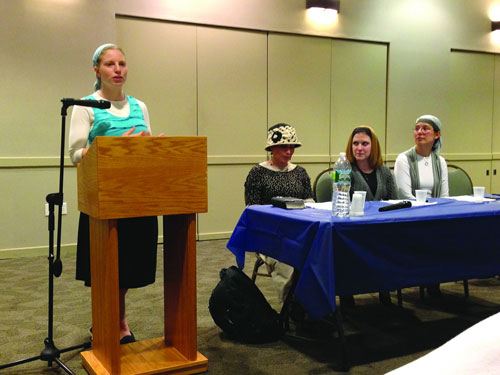.jpg)
Teaneck—Several hundred women listened intently as a panel of women scholars talked about intimacy. They learned about what the Torah commands and how women can negotiate the challenges inherent in each phase of their married lives at the Jewish Women’s Journey through Life program presented at Rinat Yisrael on the first of July.
Three of the four panelists are certified, or studying to become certified, as Yoetzet Halakha, women with advanced Talmud backgrounds who have undergone training about women’s issues in Nishmat’s Keren Ariel Halakhic Institute in Israel. Shari Taragin, a Yoetzet and teacher at many of Israel’s leading seminaries, said that the goal of the Yoetzet Halakha program was to train women leaders who can translate the laws of intimacy into practical applications, and help other women understand and keep halakha. While Rabbeim have the Torah knowledge, women generally don’t feel comfortable discussing such personal topics with men.
Taragin said at the beginning of her training as a Yoetzet Halakha, she worked with rebbeim who were surprised by how many more calls she received about women’s halakhic issues than they did. After a few months, the Rebbeim felt Taragin could handle questions on her own.
Taragin said that she found it strange that Taharat Hamishpacha, the laws of family purity, were not really taught. A woman should have someone she can call with questions about these laws, who knows when to be stringent and when to be lenient. She cited the example of a woman who thought she was being correct by waiting an extra day before immersing in the Mikvah, or ritual bath. But that stringency was causing her to miss the proper time for conception. A few months after Taragin helped this woman resolve her issue, she became pregnant.
Nechama Price, a Yoetzet–in-training and faculty member of Stern College, said that since many girls are not taught about intimacy until they become kallahs, they are literally expected to become knowledgeable about these issues overnight. But that doesn’t happen. Kallah teachers coach, but women should have someone they are comfortable talking to about intimacy and can arm them with information beyond the newlywed stage.
The beginning of a marriage is an exciting time, but can also be stressful. Price emphasized that women should never be pressured or forced to have sex. The Rambam taught that intimacy should bring Simcha. In fact, a husband is obligated to satisfy his wife.
When women are empowered with information, they can make better decisions. No one plans on unexpected problems. Newlyweds begin to worry if they don’t conceive right away; they don’t know it can normally take up to a year. Price shared that she skipped her last Lamaze class about Caesarian sections because she didn’t plan to have one,but that’s exactly how she delivered all three of her children.
A Yoetzet Halakha can discuss all of these issues, including questions related to birth control. Some methods are not permitted according to Jewish law, but others are halakhically permissible and can be considered. Price said that sometimes women need a little time to prepare for motherhood. “It’s like someone knocking at the door but we don’t answer right away because we are not ready,” she said.
Dr. Rosenfeld, a PhD in English literature who teaches Gemara, Judaism and Sexuality in Israel, became involved in teaching about issues relating to intimacy after hearing women talk about their struggles with these issues. Sexuality is not discussed in public out of a misguided notion that it is not “tzniusdik,” Dr. Rosenfeld said. But Tznius is not silence. The Talmud discusses sexuality in graphic detail. “Sex is in the Torah, too,” she added, paraphrasing the Talmud. Dr. Rosenfeld urged women to talk to their daughters before they stand under the chuppah. “Never assume your advice isn’t needed,” she cautioned.
Women can face problems at each stage in their journey through married life and need someone knowledgeable to discuss them with. Women should never overlook difficulties and say, “so what, I’ll let it go and forget about it.” That’s a dangerous attitude that impacts the marriage relationship. “Giving and receiving pleasure is a two-way street and a form of kedusha,” Dr. Rosenfeld stated.
Couples have to make time for each other and through each stage of life the challenge is different. New mothers are exhausted and sleep deprived; couples with older children have less privacy; teens stay up later than their parents. At each stage, couples must “find a way to maintain an intimate connection,” said Dr. Rosenfeld. Arranging sleepovers for the kids or taking vacations without them are two options.
When the kids move out, couples need to focus on each other. You have more time now, but have to rekindle the interest. Romantic dinners are always helpful, she suggested. And if menopause is causing physical or psychological changes, get help from a professional.
Shoshana Samuels, Yoetze tHalakha for Bergen County and teacher at Ma’ayanot Yeshiva High School for Girls, noted that even professionals need someone to go to with questions. When her baby was four months old, she had a question about going to the mikvah. Her husband was surprised and asked, “Don’t you answer this question for others all the time?” She does. “But we’re taken aback when it’s us,” she noted.
Wrapping up the discussion, Taragin noted that Taharat Hamishpacha is the woman’s responsibility and in her control. So it’s critical for her to make the right decisions. She has to learn the laws and know how to implement them.
As Dr. Rosenfeld said, sex is in Torah, too.
By Bracha Schwartz









